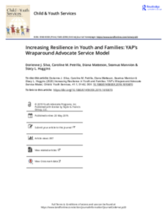Displaying 931 - 940 of 2176
The current study used a quasi-experimental design and propensity score matching to examine the outcomes for children of families served by the Iowa Department of Human Services Parent Partner program, a peer support program to mentor parents who are currently involved in the US child welfare system.
This study estimated the impact of state and individual-level risk and protective factors on adverse 19-year-old outcomes among a cohort of U.S. transition age youth.
This study synthetic cohort life tables and data from the Adoption and Foster Care Analysis and Reporting System to generate the first cumulative prevalence estimates of termination of parental rights.
This study prospectively examined risk factors of first time delinquency for maltreated youth between ages 9 and 14.
Drawing on the extant literature, this chapter will present a multileveled discussion of the experiences of prejudice and bias foster youth face, with a focus on the systemic inequities among diverse youth in foster care, the individual challenges youth with different social identities face, socialization processes that can support these youth, and challenges foster parents face in supporting foster youths’ healthy identity development.
In this article, a team of practitioners explores the basis, implementation, research base, and future application of Youth Advocate Programs, Inc. (YAP)’s dual-prong service model in building resilience in youth and families in the U.S., providing comprehensive, community-based services as an alternative to institutionalization for youth and young adults with complex needs and challenges.
A sixteen year-old boy from Guatemala has died in US custody, the fifth child to die in migrant detention in the US since December, according to this article from the Guardian.
The present study uses the US National Youth in Transition Database (NYTD) to examine educational attainment, employment, homelessness, and incarceration for white, African-American, Hispanic, and American Indian/Alaska Native emancipated youth.
The present study uses system dynamics modeling to inform decision-making by testing policies for scaling the Family Unification Program (FUP), a U.S. federal initiative connecting inadequately housed families involved in child welfare with long-term rental subsidies to avoid foster placement.
This chapter will help the reader to understand the design and outcomes of the foster care system in the USA.

